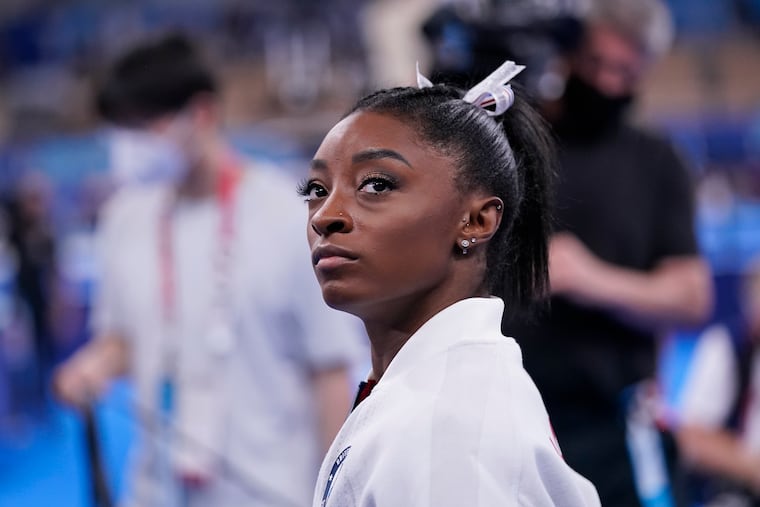Simone Biles’ withdrawal from Olympic event reignites conversations on athletes and mental health
Simone Biles said she withdrew from the women’s gymnastics team event at the Olympics in Tokyo Tuesday due to a mental struggle to compete under intense pressure, rather than a physical injury.

Simone Biles said she withdrew from the women’s gymnastics team event at the Olympics in Tokyo on Tuesday due to a mental struggle to compete under intense pressure, rather than a physical injury.
The 24-year-old was poised to perform more difficult skills than any other female gymnast and carry the U.S. women’s gymnastics team to Olympic gold. NBC promos for the team showed Biles with a goat, symbolizing her unofficial title as the gymnastics GOAT (a.k.a. Greatest of All Time).
“Physically, I feel good. I’m in shape,” Biles said in an interview with NBC. “Emotionally, it varies on the time and moment. Coming to the Olympics and being head star isn’t an easy feat.”
It was not clear if she will compete at the all-around event Thursday and individual events next week.
» READ MORE: Simone Biles’ withdrawal will make us all winners in the long run | Elizabeth Wellington
Biles joins a growing list of athletes to step back from competition to protect their mental health.
In June, Naomi Osaka pulled out of the French Open, citing concerns about her mental health after a dispute with officials about participating in post-match news conferences, which she said have led to anxiety.
Swimmer Michael Phelps has spoken about depression and suicidal thoughts. Eagles player Brandon Brooks shared his battle with anxiety after it caused him to miss a few games in 2019.
And Biles’ former teammate Aly Raisman has talked about dealing with post-traumatic stress disorder (PTSD) from convicted sex offender Larry Nassar’s abuse.
After Osaka withdrew from the French Open, Philadelphia-area mental health specialists told The Inquirer that athletes -- especially women of color -- speaking up about their mental health needs send a powerful message to teens and young adults who may also be struggling.
“We need to understand that sometimes we need to do the hard things, and sometimes that is saying no,” Jaynay Johnson, founder of Teen Talk Therapy for adolescents in the Philadelphia area, said in June. “We can push back. We can decide to center ourselves. This is not something a lot of women of color have had the opportunity to do. We often feel, ‘We have to do this, we have to do that,’ at the expense of our well-being.”
These actions can give other young women the bravery to set boundaries, even if it’s not on as large a scale, she said.
» READ MORE: Philly-area therapists explain why Naomi Osaka’s actions are significant for young women of color
After several uncharacteristic errors during the women’s qualifying round days earlier, Biles posted on Instagram about the pressure she is under.
“I truly do feel like I have the weight of the world on my shoulders at times. I know I brush it off and make it seem like pressure doesn’t affect me but damn sometimes it’s hard,” she wrote.
On Tuesday, the U.S. women’s gymnastics team went on to earn a silver medal, with Biles cheering on her teammates from the sidelines. The Russian Olympic Committee won gold.
After the competition, Biles told NBC she was “super proud of these girls and now we’re silver medalists — something we’ll cherish forever.”
“We hope America still loves us,” she said.
» READ MORE: Simone Biles qualified for all four individual event finals at the Olympics